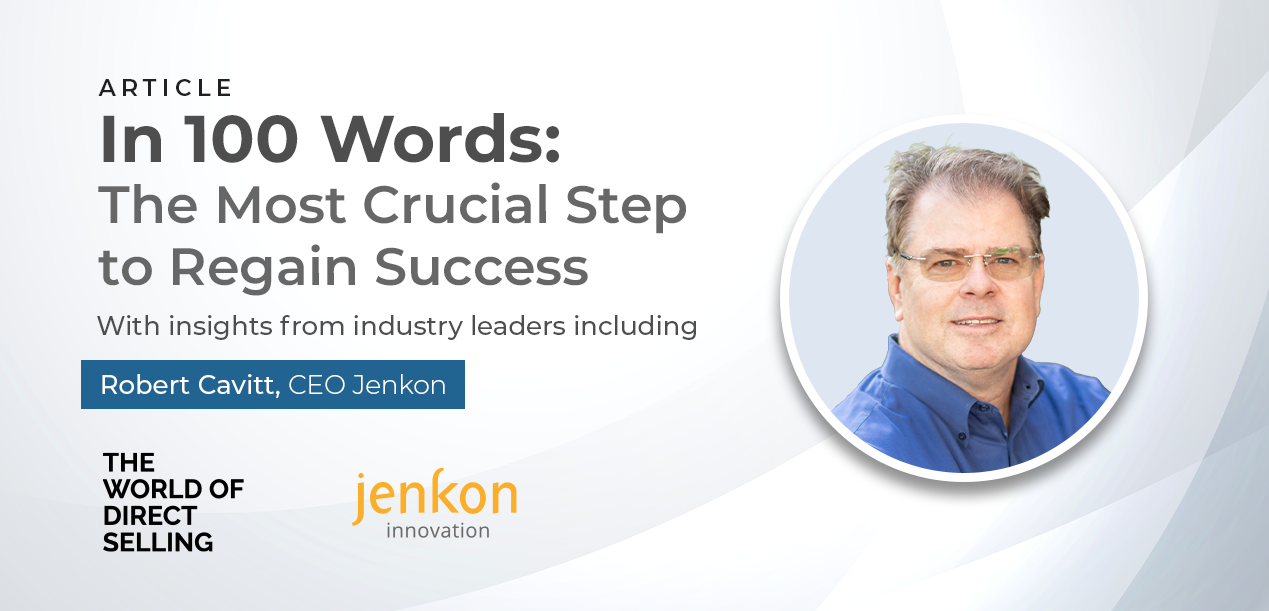“We, as the direct selling community, are stepping up and should continue to be present compliantly with unbridled optimism.”
—Meredith Berkich, Chief Growth Officer, Jenkon
Reputation is everything, and in direct selling that is especially true. So when the COVID-19 pandemic spread across the globe, it not only spurred double—and in some cases, triple—digit year-over-year growth for the channel this year, it also provided an opening for reputation improvement that many have been looking for during the past decade.
Paul Adams, a channel veteran of more than 30 years, sees an opportunity because the pandemic has pushed the channel into higher customer ratios and created an even greater focus on the customer relationship.
He says that by having distributors focus on gaining customers by emphasizing the value of the products they love and sell, as well as the service they provide, this shift will stick around. That’s why he thinks direct sellers should aim for a customer-to-distributor ratio of 10:1, or even 12:1.
Stuart MacMillan, president of MONAT Global, agrees with increasing this ratio as well and wants to see the channel focus more on customers. He believes this will help improve the channel’s reputation by re-establishing respectability and credibility. “What I’m most excited about is that changing to a 10:1 ratio is really having an impact on our communities in a big way. This lends itself to us all saying, ‘Hey guys, stop hating on us,’ ” says MacMillan.
The pandemic has changed much of everyday life over the past several months. Within the channel, many companies are experiencing increased sales and distributor enrollments, and discovering that more consumers than ever are having positive experiences.
Meredith Berkich, chief growth officer for supplier Jenkon, also sees that the channel has recently shown its chops in a compelling way. Berkich, who formerly served as president for Immunotec, Jeunesse Global, and Viridian, points out that, of all the gig opportunities available, direct selling alone continues to offer income stability and growth during the pandemic.
Recruiting is up for many companies, too—presumably due in part to job loss during the COVID-19 pandemic, as well as increased time for some.
A recent poll by the Direct Selling Association (DSA) of both member and non-member companies shows that 59 percent said the coronavirus has had a positive impact on revenue. The poll also showed 14 percent responded it has neither helped nor hurt, while 27 percent said the ongoing crisis has had a negative impact on revenue.
The growth seen during the pandemic brings with it an opportunity for the channel to further mend its image and push the needle further away from the pejorative label of “pyramid scheme” of the not-so-distant past.
This time last year, Showtime released Season 1 of the dark comedy on the greed, manipulation and deception of a fictional MLM company: On Becoming a God in Central Florida. There were plans to film Season 2; however due to the pandemic it has now been cancelled.
The series, starring Kirsten Dunst as a middle-age water park employee, is set in the early 1990s in a small town near Orlando, Florida. Portrayed as a lying, scheming con artist who jumps into a cultish, multibillion-dollar pyramid scheme to improve her life.
Dunst’s character, Krystal Stubbs, ends up hurting those around her in the process of searching for success. A far cry from the portrayal of a legitimate direct selling opportunity, the satire shows that there is still work to be done in clearly defining direct selling to the public at large. Adams says by having distributors focus on gaining customers, rather than sharing the “deal” of the business kit, distributors can emphasize the value of the products they love and sell, as well as the service they provide. This, in turn, becomes a retention-influencing reminder to them of the strength of the opportunity.
He also emphasizes “keeping it real.” He recommends offering people a legitimate opportunity to earn $500 a month rather than flashing glitz and glamour images of houses, cars, and boats.
Adams says he believes that the most effective way executives can shift direct selling’s reputation is by having the patience, determination and discipline to do the right thing with their customers. “Those corporate officers who said, ‘I’m going to focus on the customer and their experience, and making sure we treat people the way we want to be treated as consumers,’ are attracting people to that. I’ve seen that companies who are investing in that strategy in a pretty major way are seeing it pay off.”
Berkich says it best when she concludes it really comes back to the direct selling story: “We are stepping up and should continue to be present compliantly with unbridled optimism. There is no hyperbole necessary.”
She adds, “We have a powerful story to tell; companies with vision are pivoting and maximizing the opportunity. Not to take advantage of fear and uncertainty,” she says, “but to maximize the exposure by highlighting the time-proven ability for direct selling to provide hope and meet the needs of society—emotionally, physically and financially.”
Link to share this article: https://socialsellingnews.com/link/shifting-direct-sellings-reputation-3598/













